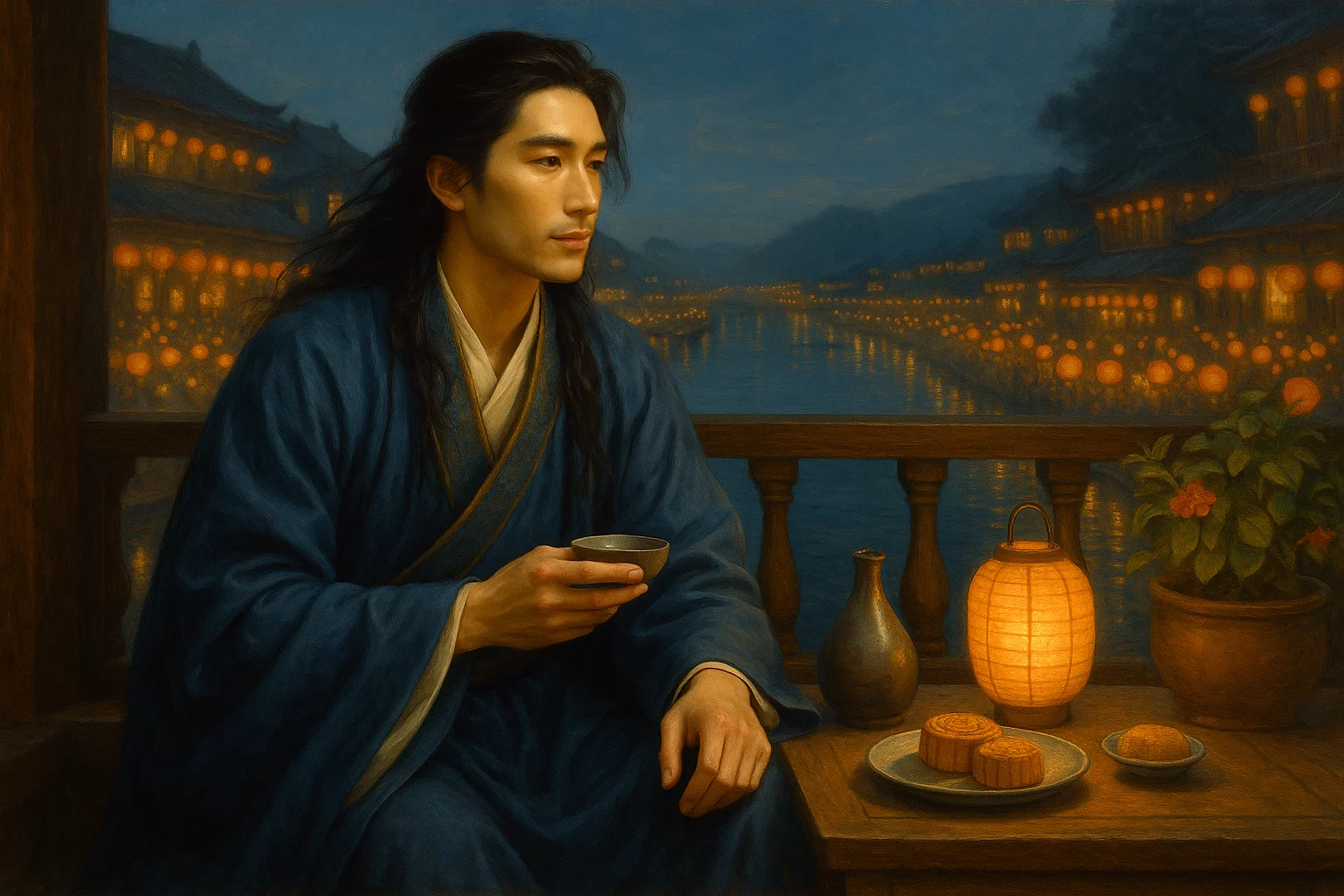Needle-rain stitches the pond's skin,
Dots punctuate duckweed's green.
Two swallows suture the red door—
Dusk scissors daylight sooner than before.
Wine floats willow-cotton code,
Past midnight, our whispers corrode.
Exile-threads knot like storm-clouds,
One window's glow—two shadows bowed.
Original Poem
「虞美人 · 廉纤小雨池塘遍」
廉纤小雨池塘遍。细点看萍面。
一双燕子守朱门。比似寻常时候、易黄昏。宜城酒泛浮香絮。细作更阑语。相将羁思乱如云。
周邦彦
又是一窗灯影、两愁人。
Interpretation
Composed in 1090 during the Yuanyou era of Emperor Zhezong's reign, this ci poem emerges from Zhou Bangyan's midlife period of professional stagnation. Serving as a provincial educational official in Luzhou and Lishui, the poet endured a lonely, itinerant existence that permeates this work. Likely written during travel or tenure, the poem channels his emotional displacement—perhaps inspired by an actual parting—into a masterful depiction of lovers' last evening together before separation. Through delicate imagery of twilight rain and intimate conversation, Zhou captures both the immediacy of farewell and the broader melancholy of transient human connections in life's journey.
First Stanza: "廉纤小雨池塘遍,细点看萍面。一双燕子守朱门,比似寻常时候,易黄昏。"
Lián xiān xiǎo yǔ chí táng biàn, xì diǎn kàn píng miàn. Yī shuāng yàn zi shǒu zhū mén, bǐ sì xún cháng shí hòu, yì huáng hūn.
Fine rain spreads across the pond,
its tiny drops tapping floating moss.
A pair of swallows guards vermilion gates—
this evening, more than usual,
night falls too soon.
The opening stanza constructs a melancholic microcosm. The "fine rain" (廉纤小雨), evoking Han Yu's famous drizzle description, becomes auditory texture through "tapping" (细点) on water plants. The "swallows guarding gates" (燕子守朱门) symbolize both domestic stability and unnatural stillness—their atypical immobility mirroring the lovers' suspended moment before parting. The stanza's genius lies in its temporal distortion: "night falls too soon" (易黄昏) subjectively accelerates time to reflect parting anxiety.
Second Stanza: "宜城酒泛浮香絮,细作更阑语。相将羁思乱如云,又是一窗灯影,两愁人。"
Yí chéng jiǔ fàn fú xiāng xù, xì zuò gēng lán yǔ. Xiāng jiāng jī sī luàn rú yún, yòu shì yī chuāng dēng yǐng, liǎng chóu rén.
Yicheng wine floats fragrant floss,
as whispers stretch deep into night.
Shared wanderer's thoughts tangle like clouds—
once more, window-lit shadows reveal
two sorrow-laden souls.
The intimate second stanza unfolds like a cinematic close-up. The "floating fragrant floss" (浮香絮) in wine visually parallels the lovers' delicate, suspended emotions, while "whispers stretching night" (更阑语) prolongs time through speech's quiet resistance to dawn. The "thoughts like tangled clouds" (羁思乱如云) metaphor brilliantly externalizes psychological turbulence, culminating in the iconic "two sorrow-laden shadows" (两愁人)—a chiaroscuro of shared melancholy where light defines absence as much as presence.
Holistic Appreciation
Zhou orchestrates a symphony of sensory and temporal paradoxes. The first stanza's exterior scene (rain, pond, swallows) establishes atmospheric pressure—the unnatural stillness of nature holding its breath. The second stanza's interior (wine, whispers, lamplight) contracts space while expanding emotional resonance, moving from macrocosmic observation to microcosmic intimacy.
The poem's structural brilliance lies in its double chronology: the natural progression from dusk to night parallels the lovers' journey from conversation to silent communion, while subjective time alternately accelerates ("night falls too soon") and decelerates ("whispers stretch night"). This temporal elasticity mirrors parting consciousness—how final moments simultaneously rush and linger.
Artistic Merits
- Meteorological psychology
The "fine rain" (廉纤小雨) isn't merely weather but emotional texture—its gentle persistence embodying unspoken sadness. - Avian symbolism
The motionless swallows (燕子守朱门) become avian sentinels of impending separation, their typical migratory nature suppressed by human drama. - Liquid metaphor
Wine's floating floss (酒泛浮香絮) operates as triple metaphor—for delicate feelings, transitory moments, and the intoxicating suspension before farewell. - Shadow play
The "window-lit shadows" (一窗灯影) epitomize Song dynasty chiaroscuro aesthetics, where illumination reveals emotional depth through silhouette.
Insights
Zhou's poem unveils how intimacy transforms ordinary spaces into sacred geography. The pond, gates, and lamplit window cease to be mere locations—they become repositories of emotional truth, where rain records whispers and shadows hold more substance than physical forms.
For contemporary readers, the work demonstrates how profound connection thrives in temporal interstices. The lovers' "whispers stretching night" model resistance to chronological inevitability—a lesson in valuing presence over punctuality. The "two sorrow-laden shadows" remind us that true companionship often means sharing silence more than speech.
Ultimately, the poem suggests that parting's poignancy stems from its power to sanctify the mundane. Wine becomes sacrament, rain turns to requiem, and a simple window frames humanity's eternal condition—our fleeting intersections of light in darkness' vastness. Zhou elevates a routine farewell into universal meditation on how love etches meaning onto time's indifferent canvas.
About the Poet

Zhou Bangyan (周邦彦 1056 - 1121), a native of Qiantang (modern Hangzhou, Zhejiang), was the culminating master of the wanyue (graceful and restrained) ci poetry of the Northern Song Dynasty. A virtuoso in musical temperament, his ci are renowned for their opulent refinement and technical perfection. He created dozens of new melodic patterns (cipai) and adhered to strict tonal rules, earning him the title "Crown of Ci Poets." His influence extended to Southern Song masters like Jiang Kui and Wu Wenying, establishing him as the founding patriarch of the Rhymed Ci School.












